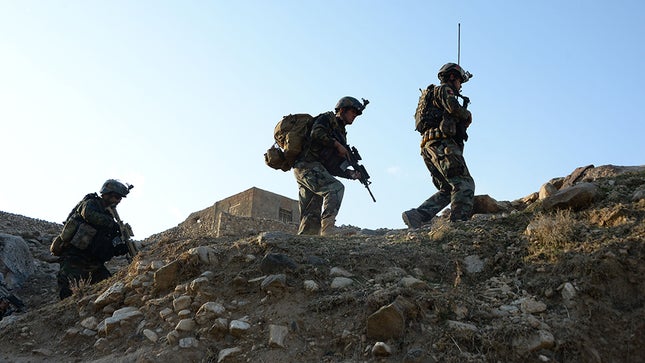At a course I teach at the University of Pennsylvania on press and politics, students are assigned to write an op-ed or column. The exemplar is Harry Truman’s economist: the former president — frustrated by advice of “on the one hand but then on the other” — wanted a one-handed economist.
Should America finally get out of our longest war, with little end in sight — or would it just create a new terrorist safe harbor and a tragic setback for progress that has been made for women and others?
There is a pretty persuasive case … on both sides.
The Trump administration, negotiating with the Taliban, agreed to withdraw the 2,500 American soldiers still there by this May 1. It’s widely agreed that the promise they got in return from the Taliban — no violence — have been abrogated from the get-go.
President Biden, a dove on Afghanistan during the Obama administration, is deciding in the next month or so whether to keep that commitment.
Secretary of State Tony Blinken is trying to get the United Nations and major countries in the region to revise Doha. This is the fourth American president to grapple with the Afghan dilemma.
The case for getting out is clear: Americans went into Afghanistan in 2001 after Osama Bin Laden used it as a launching pad for the 9-11 attack. Since then, 2,400 Americans have died; over 20,000 have been wounded, at a cost to the treasury in the trillions. For the first several years, there was progress: then as the Bush administration shifted its focus to Iraq, progress stopped. The Taliban now again controls most of the country outside of a few cities.
Corruption in Afghanistan today remains pervasive, leadership splintered. The dreams of nation building are a cruel hoax.
Moreover, as the Washington Post revealed a little more than a year ago in the government’s private papers, American leaders — civilian and military — have lied to the public about the prospects of a war that they knew was unwinnable.
Shades of Vietnam.
Yet there are dire warnings from serious people against a precipitous withdrawal. To leave entirely on May 1 would be “destabilizing,” said Senate Armed Services Committee chairman Jack Reed (D-R.I.). Afghanistan can’t be “the source of planning, plotting to project terrorist attacks,” warned one of the leading congressional authorities on national security. “I’m not sure we can do that without some presence there.”
That view was echoed by a congressionally appointed, bi-partisan Afghanistan Study Group. They noted the Taliban violence against Afghans has actually increased since they signed the Doha pact, killing thousands.
The human price of a Taliban takeover, probable if America leaves, would be painfully cruel. There has been progress on basic rights, especially for women. Some 3.5 million girls are in schools now, a 70-fold increase from 2001. If the fundamentalist Islamists, who ran the country before, regain power that progress will be wiped out.
The 2,500 current U.S. forces, down from 100,000 a decade ago, and supplemented by another 7,000 from allies, serve mainly in about a dozen enclaves. They protect some Afghan security forces and mount counterterrorism efforts.
When last week’s New Yorker arrived, I thought maybe I’d found the equivalent of the one-handed economist: a long piece by Dexter Filkins, the great war correspondent. He paints a bleak picture of Afghan governing and the ability to secure the nation against the Taliban; the piece also captures the bravery of places like Afghan Women’s Skills Development Center, which provides shelter for battered women and job training.
The heart says don’t leave those struggling women. If just a few more months or a year would do the trick, it’s a no-brainer. But if America stays, the Taliban will attack our forces, pressure will mount to send in reinforcements. On May 1, 2022, we’ll hear the same arguments: just a little more time.
Shades of Vietnam.
Nineteen years ago, I embraced the decision to go into the country that sheltered Bin Laden. My friend, Roger Altman, asked me simply: “Do you know the history of Afghanistan?”
For centuries this country, with its rugged terrain and dozens of often warring ethnic tribes, has repulsed invading forces: The British, the Russians, and now most likely the Americans.
Remember Rudyard Kipling a century and a quarter ago: “When you’re wounded and left on Afghanistan’s plains, and the women come out to cut up what remains, jest roll to your rifle and blow out your brains and go to your Gawd like a soldier.”













